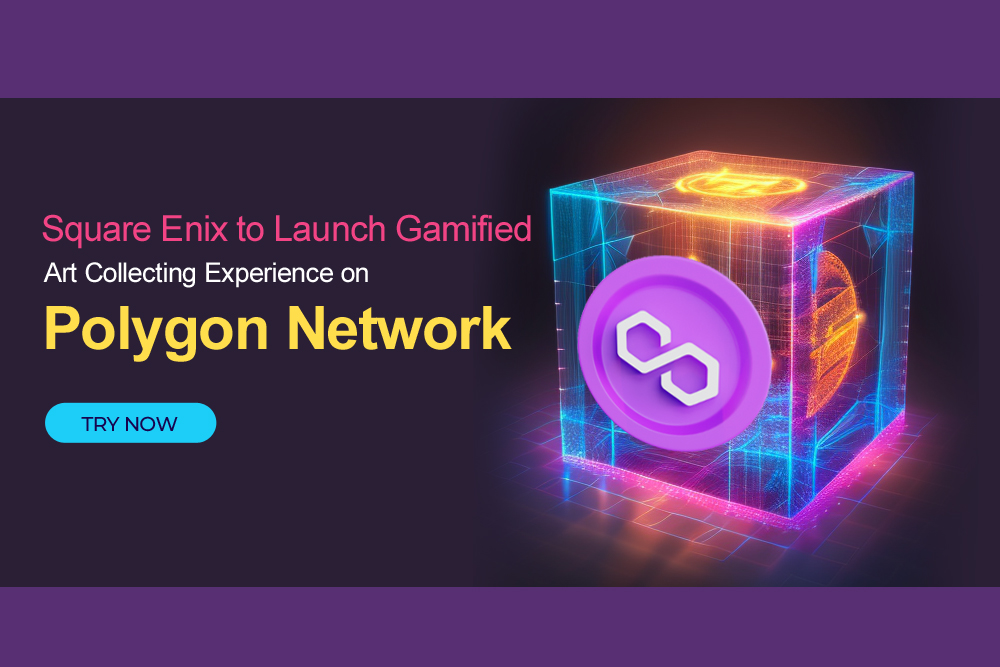
Square Enix, the Japanese video game publisher behind iconic titles like Final Fantasy and Tomb Raider, has announced a collaboration with Polygon, a major Ethereum-based blockchain platform, to create an NFT art project. The collaboration will investigate the convergence of blockchain technology, gaming, and digital art, showcasing the potential for novel applications in the fast growing blockchain ecosystem.
The cooperation will result in the creation of one-of-a-kind NFTs based on original artwork from Square Enix’s games, which will be minted on the Polygon blockchain. Polygon was selected as a partner because of its scalability and cheap transaction fees, making it a perfect platform for producing and trading NFTs.
Non-fungible tokens, or NFTs, are one-of-a-kind digital assets that may be bought and sold on a blockchain. They can represent several types of digital content, such as artwork, music, and video games. As a means of proving ownership and authenticity in the digital realm, NFTs are gaining popularity as a new way for artists and producers to commercialise their work.
The collaboration between Square Enix and Polygon is not the first of its kind; other gaming firms and blockchain platforms have also investigated the convergence of gaming and NFTs. The relationship is noteworthy, though, because of Square Enix’s standing in the game business, with the company having a vast and committed fanbase worldwide.
In addition to investigating the possibilities of NFTs, the collaboration will explore the usage of blockchain technology in gaming. Blockchain technology has the potential to revolutionize the gaming business by enabling new types of games such as decentralized gaming and player-owned economies.
Square Enix and Polygon’s collaboration demonstrates the growing interest in blockchain technology among established firms and industries. We should expect more collaborations between traditional firms and blockchain startups as the promise of blockchain technology becomes more publicly recognized.
One of the primary advantages of blockchain technology is its ability to increase transaction trust and transparency. This is especially significant in the gaming sector, where concerns like fraud, cheating, and ownership and authenticity disputes are widespread. Blockchain technology allows for the creation of a tamper-proof and transparent record of all transactions, which makes it easier to assure fair and equal gameplay.
The collaboration between Square Enix and Polygon is also significant in terms of the potential for NFTs to establish new revenue streams for artists and creators. NFTs give a new opportunity for creators to monetise their work and establish an audience by producing unique digital assets that can be bought and traded on a blockchain.
The usage of NFTs in gaming is still in its early stages, but it has the potential to transform the industry by allowing players to interact with games in new ways and producers to monetize their work. The collaboration between Square Enix and Polygon is just one example of the numerous use cases that are emerging in the blockchain ecosystem.
We should expect more cooperation between established organizations and blockchain startups, as well as more new use cases for blockchain technology, as blockchain technology evolves and matures. The collaboration between Square Enix and Polygon is an exciting step in this quickly expanding field, and it will be interesting to see how the initiative evolves and what new prospects it generates for the gaming business and digital art.
Open your free digital wallet here to store your cryptocurrencies in a safe place.

Introduction to the Potential of Blockchain Technology
Blockchain, the technology behind Bitcoin, is a decentralized digital ledger that records transactions across a network of computers. It offers transparency, security, and immutability, making it perfect for the gaming industry. One of the most significant ways blockchain is set to revolutionize gaming is through the use of non-fungible tokens (NFTs). NFTs are unique digital assets stored on a blockchain, and they can be used to represent in-game items such as weapons, armor, and collectibles. This allows for true ownership of in-game assets, and players can trade, sell, or even hold on to them as investments. This new level of ownership and control over in-game assets is set to change the way we play and interact with our favorite games.
Utilization of Non-Fungible Tokens (NFTs) for True Ownership and Control of In-Game Assets
NFTs are unique digital assets stored on a blockchain, and they can be used to represent in-game items such as weapons, armor, and collectibles. This allows for true ownership of in-game assets, and players can trade, sell, or even hold on to them as investments. This new level of ownership and control over in-game assets is set to change the way we play and interact with our favorite games.With blockchain, game developers can create and distribute their games without the need for centralised platforms such as Steam or the App Store. This allows for a more decentralised distribution model, giving game developers more control over their creations and a direct connection with their players.
New Monetization Opportunities
Blockchain technology also has the potential to change the way players are rewarded for their in-game activities. In traditional games, players are often rewarded with in-game currency or items that have no real-world value. With blockchain, players can be rewarded with digital assets that have real-world value, such as cryptocurrency or NFTs. This can change the way players view in-game rewards and create new monetisation opportunities for game developers.Online gaming is also set to benefit from blockchain technology. In traditional online games, players rely on centralized servers to host and run the game, which can lead to issues such as lag and downtime. With blockchain, online games can be run on a decentralised network, eliminating the need for centralised servers and making online gaming more reliable and efficient.
Conclusion: The Exciting New Era of Blockchain Gaming and its Impact on the Crypto Community
In conclusion, the gaming industry is on the cusp of a revolution thanks to the introduction of blockchain technology. The use of non-fungible tokens, decentralized game development and distribution, and the ability to reward players with digital assets of real-world value are just a few of the ways that blockchain is set to change the way we play and interact with our favorite games. As a HolyTransaction, we believe that this integration of blockchain technology into the gaming industry is an exciting development for the crypto community. Not only does it open up new opportunities for monetization and investment, but it also helps to further mainstream the use of digital assets like Bitcoin. In the coming years, we expect to see more and more games incorporating blockchain technology and new blockchain-based games being created. This new era of blockchain gaming is not only a win for players and game developers, but also for the crypto community as a whole. As the technology continues to evolve, we can’t wait to see the innovative ways that blockchain will change the gaming industry for the better. So, let’s gear up for the blockchain revolution in gaming and the possibilities it holds for Bitcoin and the broader cryptocurrency ecosystem.
Open your free digital wallet here to store your cryptocurrencies in a safe place.
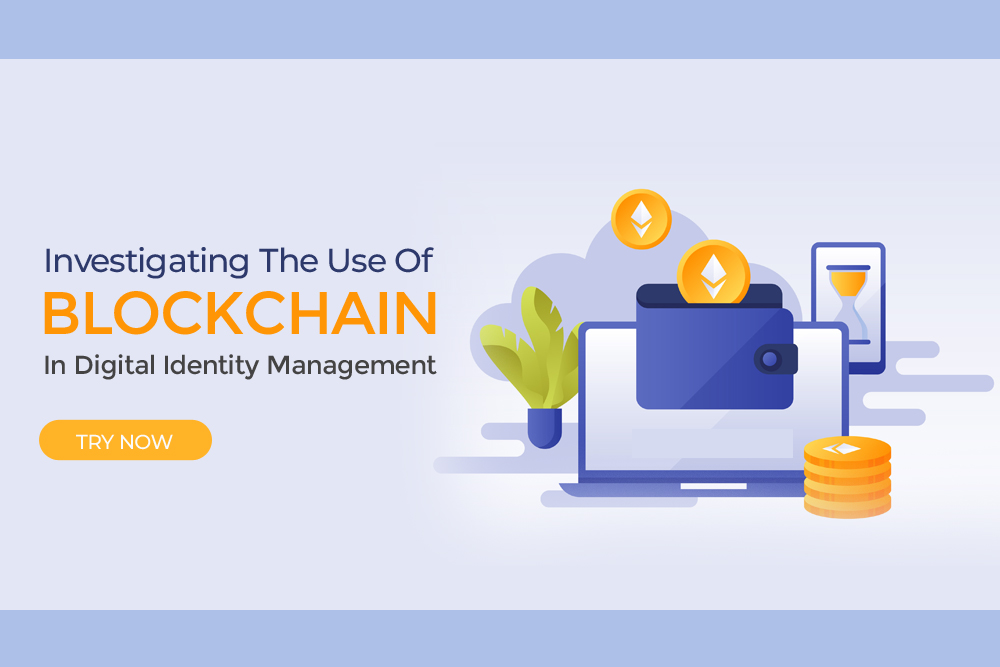
Digital identity management is a crucial aspect of our digital lives, as it enables us to prove our identities online and access a wide range of services. However, current digital identity management systems are often centralised and controlled by a few large corporations, which can lead to issues such as data breaches and lack of control over personal information. Blockchain technology has the potential to revolutionise digital identity management by creating a decentralised, secure, and user-controlled system.
Blockchain technology is a decentralised, digital ledger that records transactions across a network of computers. It is the technology behind the popular cryptocurrency, Bitcoin, but its potential uses go far beyond just financial transactions. One of the key features of blockchain technology is its ability to enable secure and transparent transactions, without the need for a central intermediary.
In digital identity management, blockchain technology can be used to create a decentralised system, where users have complete control over their personal information and can prove their identities without relying on a central authority. This would allow for greater security and privacy, as personal information would be stored on the blockchain and protected by cryptographic techniques. Additionally, the use of blockchain technology would increase transparency, as all transactions and changes to personal information would be recorded on the blockchain, creating an auditable and immutable record.
The importance of OpenTimestamp in digital identity management cannot be overstated. OpenTimestamp is an open-source protocol that enables secure and verifiable time-stamping of data in the blockchain. This means that it can be used to create a tamper-proof record of a user’s digital identity, making it more difficult for others to manipulate or alter the data. This added security and trust will further contribute to the success and widespread adoption of blockchain-based digital identity management systems.
A decentralised digital identity management system would allow for greater control over personal information, as users would be able to store and manage their own personal information, rather than relying on a central authority. This would also increase security, as personal information would be stored on the blockchain and protected by cryptographic techniques. Additionally, a decentralised system would be more resilient to data breaches and cyber attacks, as there would be no central point of failure.One of the key benefits of a decentralised digital identity management system is that it would allow for greater interoperability between different systems and platforms. This would enable users to prove their identities across a wide range of services, without the need to create multiple identities or share personal information with multiple organisations.
Another potential use of blockchain technology in digital identity management is the concept of self-sovereign identity. This would allow users to have complete control over their personal information and use it to prove their identities across a wide range of services. This would be done through the use of digital identity credentials, which are stored on the blockchain and can be used to prove identity without the need for a central intermediary. The use of blockchain technology in self-sovereign identity would also increase transparency and trust in the digital identity management system, as all transactions and changes to personal information would be recorded on the blockchain, creating an auditable and immutable record. This would help to prevent fraud and manipulation in the digital identity management system, and increase trust among users.
Blockchain technology has the potential to revolutionise digital identity management by creating a decentralised, secure, and user-controlled system. This would allow for greater control over personal information, increase security and privacy, and enable users to prove their identities across a wide range of services. While the technology is still in its early stages, the potential benefits of blockchain technology in digital identity management are clear, and it will be interesting to see how it develops in the coming years.
Open your free digital wallet here to store your cryptocurrencies in a safe place.
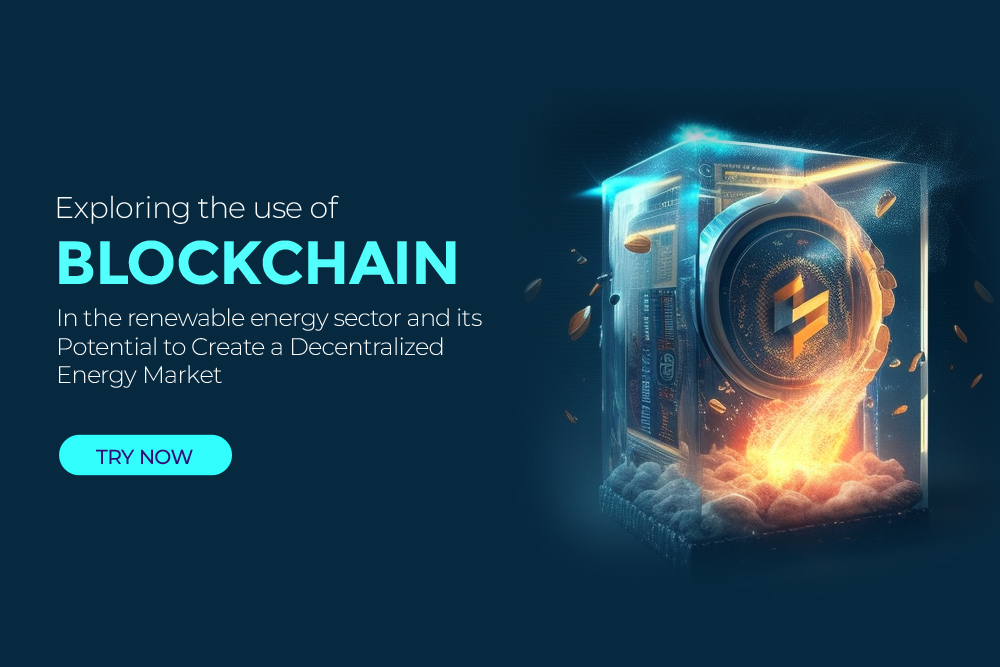
The renewable energy sector has been growing at a rapid pace, with a growing demand for clean and sustainable energy sources. However, the conventional energy market is centralized and controlled by a few large corporations, leading to a lack of transparency. Blockchain technology has the potential to transform the energy sector by creating a decentralized market, where consumers can generate, share, and trade energy directly with one another.
Blockchain is a decentralized, digital ledger that records transactions across a network of computers. It is the technology behind the popular cryptocurrency, Bitcoin, but its potential uses go far beyond just financial transactions. One of its key features is the ability to enable peer-to-peer transactions without the need for a central authority, making it a valuable tool for creating a decentralized energy market.
A decentralized energy market would increase competition in the energy sector, as more players would be able to participate in the market. This would lead to a more efficient market, with lower costs for consumers. Additionally, a decentralized energy market would better integrate renewable energy sources as the distributed nature of renewable energy generation would align with a decentralized market. One of the key benefits is that it would allow for greater participation by individuals and communities in the energy sector, empowering communities to generate their own energy and sell the excess back to the grid. This would also increase energy security, as communities would not be dependent on a central authority for their energy needs.
One of the most significant potential uses of blockchain technology in the renewable energy sector is peer-to-peer energy trading. This would allow individuals and communities to trade energy directly with one another without the need for a central intermediary, increasing competition in the energy market and lowering costs for consumers. It would also allow for greater flexibility in the energy market, as energy could be traded in real-time, meeting the changing needs of the market. Blockchain technology would increase transparency in the energy market, as all transactions would be recorded on the blockchain, creating an auditable and immutable record, preventing fraud and increasing trust among market participants.
PowerLedger is a blockchain platform that provides a solution for a decentralized energy market. It enables consumers to trade renewable energy directly with one another without the need for a central intermediary. The platform uses smart contracts to facilitate transactions and provides a transparent and secure record of all energy transactions. PowerLedger has already been implemented in a number of successful pilot projects and has been recognized for its potential to disrupt the traditional energy market.
The potential benefits of blockchain technology in the renewable energy sector are numerous. A decentralized energy market would increase competition, lower costs for consumers, and allow for greater participation by individuals and communities in the energy sector. Peer-to-peer energy trading, enabled by blockchain technology, would increase transparency, trust, and flexibility in the energy market. PowerLedger is a leading project in the decentralized energy market, using blockchain technology to trade excess renewable energy and create a transparent record of all energy trades. In conclusion, blockchain technology has the potential to create a more efficient, sustainable, and transparent energy market for the future.
Open your free digital wallet here to store your cryptocurrencies in a safe place.

Bitcoin mining is the process of using specialized computer hardware to validate transactions on the Bitcoin blockchain and earn rewards in the form of newly minted Bitcoins. This process requires a significant amount of energy and generates a lot of heat as a byproduct. In recent years, some individuals have started using their Bitcoin mining rigs to heat their homes as an alternative to traditional heating methods.
One of the main advantages of using a Bitcoin mining rig for heating is the cost savings. Bitcoin mining can be a profitable endeavor, and the heat generated by the rig can be used to offset the cost of heating the home. Additionally, using a mining rig for heat can also help to reduce the overall carbon footprint of the home, as it eliminates the need for fossil fuels or other non-renewable sources of heat.
Another advantage of using a mining rig for heat is the flexibility it offers. Many mining rigs can be easily moved from room to room or even from house to house, allowing individuals to easily adjust the heating in their home as needed. Additionally, some mining rigs can be controlled remotely, allowing individuals to turn the heat on or off and adjust the temperature from anywhere using a smartphone or computer.
One real-life example of using a Bitcoin mining rig for heating is a company based in the United States called Qarnot Computing. They have created a heating system called “QH-80” that is specifically designed for this purpose, it’s a small, plug-and-play device that can be used to heat a room or small apartment. The device is equipped with several high-performance computing chips that can be used for both mining and heating, with the heat being distributed through a series of built-in radiators. The company claims that the device can heat a room of about 150 square feet for roughly $30 per month, which is significantly less than the cost of traditional heating methods.
A third example is a man from Norway named “Kristoffer Koch” who became a millionaire by investing in Bitcoin early on. He invested 150 kroner ($26.60) in 5,000 bitcoins in 2009 and forgot about it. When he rediscovered his investment in 2013, the value of his bitcoins had grown to $886,000, he decided to use a part of his fortune to install a heating system in his house that runs on Bitcoin mining. He claims that it’s cheaper and more environmentally friendly than the traditional heating methods.
Heat4Mine is a Dutch company that provides a solution for using the heat generated by Bitcoin mining rigs to heat homes. They have developed a system that captures the heat generated by mining rigs and uses it to heat water, which is then distributed through a building’s heating system. This allows homeowners to offset the cost of heating their home with the profits generated from mining Bitcoin. The company claims that their system is a more sustainable and eco-friendly alternative to traditional heating methods, as it reduces the need for fossil fuels. According to their website, they have been providing this service since 2017.
Despite these advantages, using a Bitcoin mining rig for heating does have some drawbacks. One of the main disadvantages is the initial cost of setting up the rig. Mining rigs can be quite expensive, and the cost may not be worth it for those who only plan to use it for heating. Additionally, the noise and heat generated by the rig can be quite substantial, which may not be suitable for some individuals.
Another potential drawback is the fact that the mining rig will require regular maintenance, which can be time-consuming and costly. Additionally, mining rigs are not always reliable and may break down or malfunction, which can be a major inconvenience for those who rely on them for heat.
Despite these drawbacks, using a Bitcoin mining rig for heating is becoming an increasingly popular option for those looking for an alternative to traditional heating methods. As the price of Bitcoin continues to rise, the profitability of mining also increases, making it a more viable option for those looking to offset the cost of heating their home. Additionally, as the world continues to focus on reducing carbon emissions and becoming more energy efficient, using a mining rig for heat may become a more appealing option for those looking to reduce their environmental impact.
It’s important to note that the profitability and cost-effectiveness of using a mining rig for heat will depend on several factors, including the cost of electricity, the current price of Bitcoin, and the efficiency of the rig itself. Additionally, it’s also important to consider the noise and heat generated, and maintenance requirements before making a decision. It’s also important to note that while this is a potential use case, it’s not yet widely adopted or popular. It’s still a niche application of the technology.
In conclusion, using a Bitcoin mining rig for heating can be a cost-effective and energy-efficient alternative to traditional heating methods. It can also help reduce carbon footprint and offer flexibility to adjust heating as per need. However, it’s important to weigh in the initial costs, maintenance requirements, noise and heat generated and the overall profitability before making a decision. As with any technology, it’s important to keep in mind that it may not be suitable for everyone, but for those who it does work for, it can be a great way to save money and reduce their environmental impact.
Open your free digital wallet here to store your cryptocurrencies in a safe place.
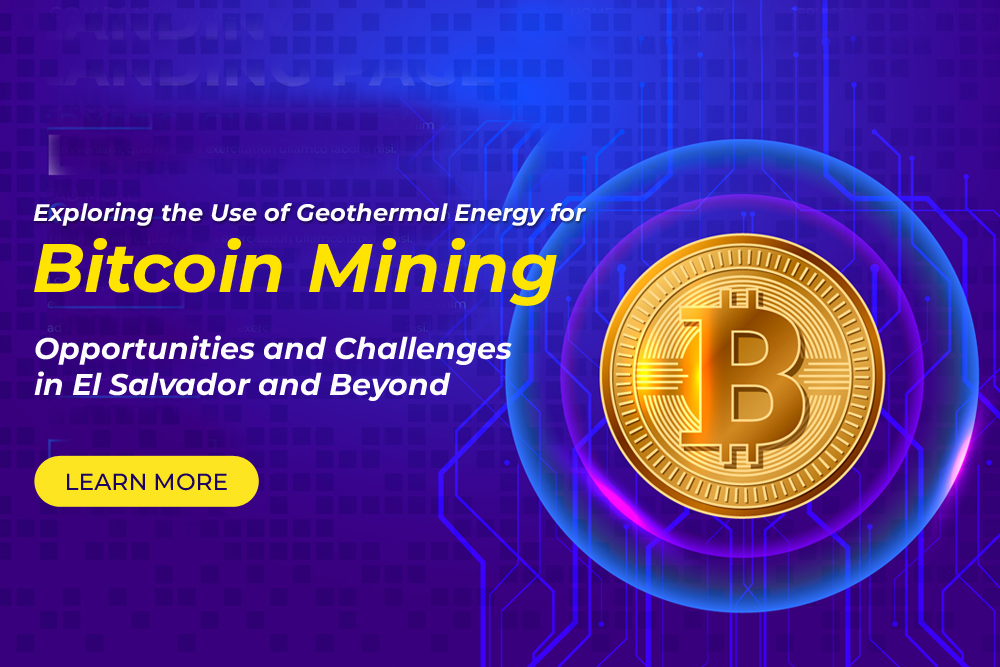
As the cryptocurrency industry continues to grow, the energy consumption of Bitcoin mining has become a concern for many. Bitcoin mining, the process by which new bitcoins are created, requires high computational power, which in turn requires a large amount of energy. This has led to an increased focus on sustainable energy sources for Bitcoin mining. Geothermal energy, a renewable and low-carbon energy source, is one potential solution to this problem.
Geothermal energy has several advantages that make it an attractive option for Bitcoin mining. Firstly, geothermal energy is a reliable source of power as it is generated from the Earth’s heat, which is constant and abundant. Secondly, geothermal energy is relatively low-cost compared to other forms of renewable energy. This can help reduce the overall energy costs of Bitcoin mining operations. Lastly, geothermal energy has a low environmental impact, making it a sustainable option for Bitcoin mining.
One example of a company that is successfully using geothermal energy for Bitcoin mining is Genesis Mining, one of the largest cloud mining companies in the world. They have a geothermal-powered mining farm in Iceland, which allows them to use renewable and low-cost energy to mine bitcoins. This has helped them to reduce their overall energy costs and increase their profits. Another example is the case of El Salvador, where the government is actively promoting the use of geothermal energy for Bitcoin mining through incentives and regulations.
While geothermal energy has many advantages, there are also limitations to using it for Bitcoin mining. One limitation is that geothermal resources are not widely available, and are mostly concentrated in certain areas such as Iceland and New Zealand. This can make it difficult for companies to access geothermal energy, especially if they are located in areas without geothermal resources. Another limitation is the high cost of setting up geothermal power plants. This can be a significant barrier for companies that want to switch to geothermal energy for Bitcoin mining.
Despite these limitations, the use of geothermal energy for Bitcoin mining is an area of active research and development. Companies such as Genesis Mining are actively researching ways to improve the efficiency and scalability of geothermal energy for Bitcoin mining. Additionally, research and development of geothermal energy for Bitcoin mining can help increase the availability of geothermal resources, making it more accessible for companies around the world.
In conclusion, geothermal energy is a promising option for Bitcoin mining. It offers several advantages such as reliability, low cost, and low environmental impact. However, there are also limitations to using geothermal energy such as limited availability and high costs. With ongoing research and development, it is likely that geothermal energy for Bitcoin mining will become more widely available and cost-effective in the future. Countries like El Salvador are showing how it is possible to use geothermal energy to power Bitcoin mining operations while reducing environmental impact. By promoting the use of renewable energy sources and providing incentives for companies, governments can play a key role in encouraging the sustainable development of the cryptocurrency industry.
Open your free digital wallet here to store your cryptocurrencies in a safe place.
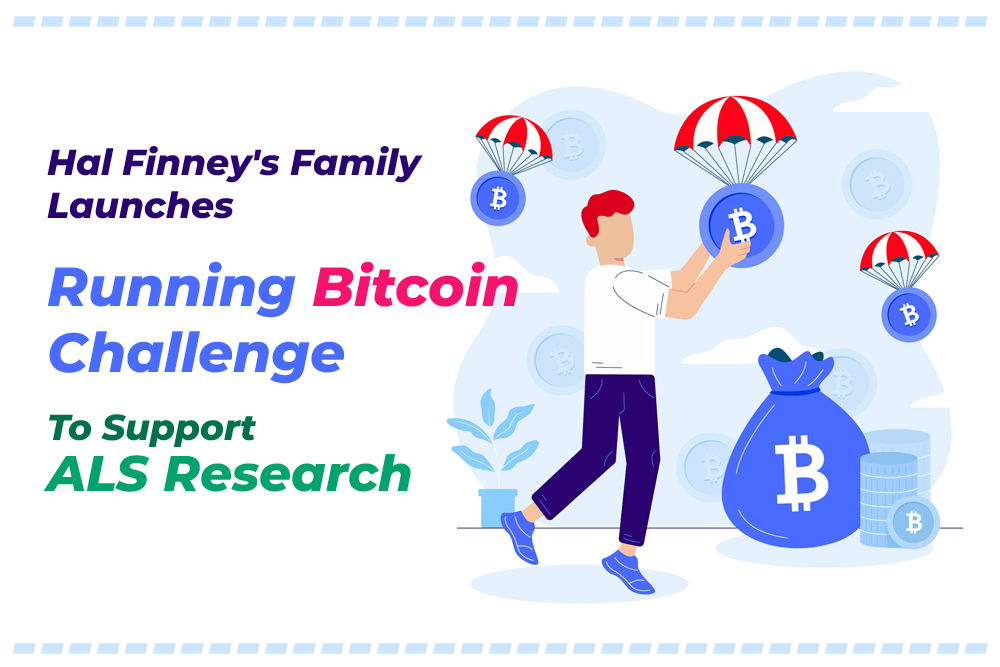
The Running Bitcoin Challenge: Honoring Hal Finney’s Memory and Supporting the Fight Against ALS
Hal Finney was a renowned computer scientist and cryptocurrency developer known for his contributions to the development of Bitcoin. In 2008, he received the first-ever Bitcoin transaction from Satoshi Nakamoto, the pseudonymous creator of Bitcoin. Tragically, Finney passed away in 2014 due to complications from Amyotrophic Lateral Sclerosis (ALS), also known as Lou Gehrig’s disease.
A Half Marathon Fundraiser for a Good Cause
In honor of Finney’s legacy, his spouse Fran Finney has organized the Running Bitcoin Challenge, a half marathon fundraiser that takes place between January 1 and January 10 each year. Finney was an avid runner before being diagnosed with ALS in August 2009. Despite a long battle with the disease, he was cryonically preserved in 2014. The Running Bitcoin event serves as a way to honor his memory and raise funds for an important cause. Those who donate at least $100 will receive an official Running Bitcoin T-shirt, and the top 25 fundraisers will receive a rare Hal Finney collectible.
The First Bitcoin Transaction and a Tweet That Changed the World
This timing coincides with the anniversary of Hal Finney’s famous “Running Bitcoin” tweet, in which he announced that he was contributing to the code to the Bitcoin codebase in 2008 and early 2009, and he was the recipient of the first-ever Bitcoin transaction, in which Satoshi Nakamoto sent him 10 BTC. Finney was a pioneer in the field of computer science and a strong advocate for privacy and civil liberties. His work in these areas continues to inspire others to fight for these values.
A Decentralized Event That Can Be Participated in From Anywhere
Participants in the Running Bitcoin Challenge can run, walk, roll, or hike the equivalent of a half marathon (Finney’s favorite distance) either in one go or over the entire 10-day period. There is no set location for the challenge, so participants can join from anywhere they wish. Those who donate at least $100 will receive an official shirt with the half marathon’s logo, and the top 25 fundraisers will receive a Hal Finney collectible signed by his wife. The Running Bitcoin Challenge serves as a way to honor Finney’s memory and raise funds for the important cause of finding a cure for ALS.
The Running Bitcoin Challenge has been a successful fundraiser, raising hundreds of thousands of dollars for ALS research. In addition to supporting research, the challenge also serves as a way for people to honor Finney’s memory and pay tribute to his contributions to the world of cryptocurrency.
Support the Cause and Honor Hal Finney’s Memory
By participating in the Running Bitcoin Challenge and raising funds for ALS research, individuals can help make a difference in the fight against this devastating disease and honor Finney’s memory at the same time. The event is being held in cooperation with the ALS Association Golden West Chapter, which provides equipment loans and educational materials to people living with ALS.
One of the unique aspects of the Running Bitcoin Challenge is that it is a decentralized event, meaning that it can be participated in from anywhere in the world. This makes it accessible to people from all walks of life and allows for a diverse group of participants to come together in support of the cause.
Overall, the Running Bitcoin Challenge is a unique and meaningful way to honor the memory of Hal Finney and support the fight against ALS. It is an opportunity for the cryptocurrency community to come together and make a difference in the world.
Open your free digital wallet here to store your cryptocurrencies in a safe place.
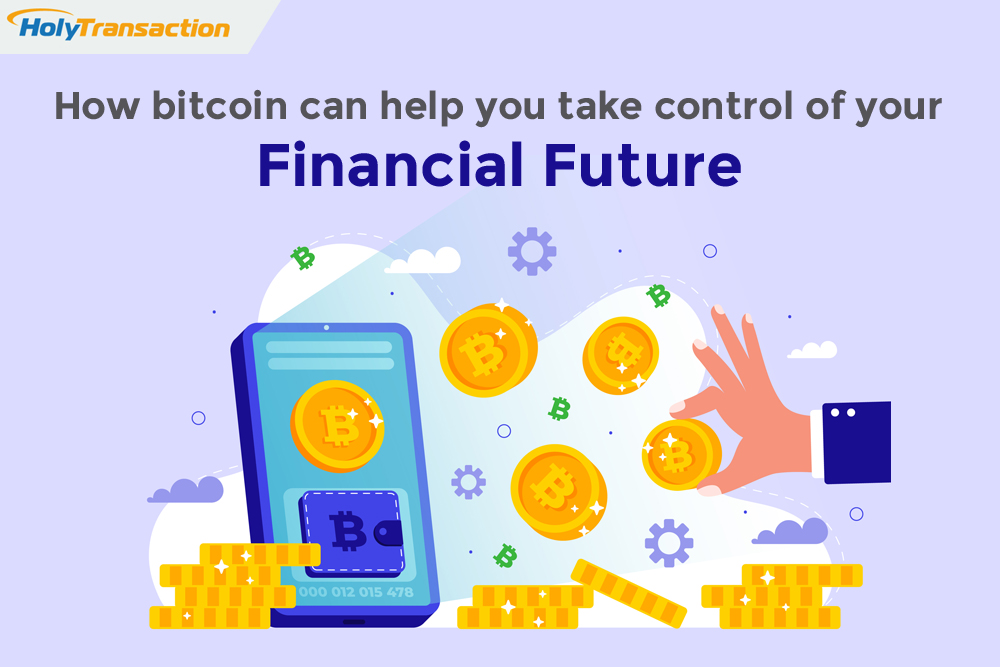
Bitcoin is a decentralized digital currency that has gained popularity in recent years for conducting online transactions. HolyTransaction is proud to offer our users the benefits of using this innovative digital currency, including security, low transaction fees, and greater control over one’s own cryptocurrencies.
One of the key advantages of using Bitcoin for online transactions is its decentralized nature. This makes it a secure option for conducting transactions and protects against the potential for a single point of failure. In addition, each transaction is verified by the network of computers that run the Bitcoin software, making it virtually impossible to forge or counterfeit.
Another benefit of using Bitcoin is its low transaction fees. Because there are no intermediaries such as banks or credit card companies involved in the process, transaction fees are typically much lower than they would be with traditional forms of payment. This can be especially beneficial for those who conduct a large number of transactions, such as small business owners or online merchants.
In addition to these benefits, using Bitcoin can also offer users more control over their own money. Because it is decentralized and not controlled by any one entity, users are free to store, send, and receive Bitcoin without interference from third parties. This can be especially valuable in countries where access to traditional financial services is limited.
Another potential benefit of using Bitcoin is its potential for growth. Because there is a limited supply of Bitcoins, and the demand for them is increasing, the value of the currency has the potential to increase over time. This makes it a potentially attractive investment option for those looking to grow their wealth.
Of course, there are also risks associated with using Bitcoin. The value of the currency can be volatile, and there have been instances of large-scale attacks on Bitcoin exchanges. However, these risks can be mitigated by taking steps to protect your Bitcoin wallet.
At HolyTransaction, we are committed to providing our users with a reliable platform for buying and selling Bitcoin. With a user-friendly interface and low fees, HolyTransaction is the perfect place to start your journey with Bitcoin and take control of your financial future.
In addition to our exchange services, we also offer a range of other tools and resources to help our users make the most of their Bitcoin experience. Our educational materials and support team can provide guidance and assistance for beginners, while our user-friendly trading options are ideal for those just starting out with Bitcoin.
We are constantly working to improve and expand our services to meet the needs of our users. This includes the addition of new cryptocurrencies and features, as well as ongoing efforts to enhance security and user experience.
At HolyTransaction, our goal is to make Bitcoin accessible and easy to use for everyone. Whether you are a beginner looking to get started with Bitcoin or just want an easy and secure way to buy and sell the digital currency, we have something for you. Join us on our mission to help you take
Open your free digital wallet here to store your cryptocurrencies in a safe place.
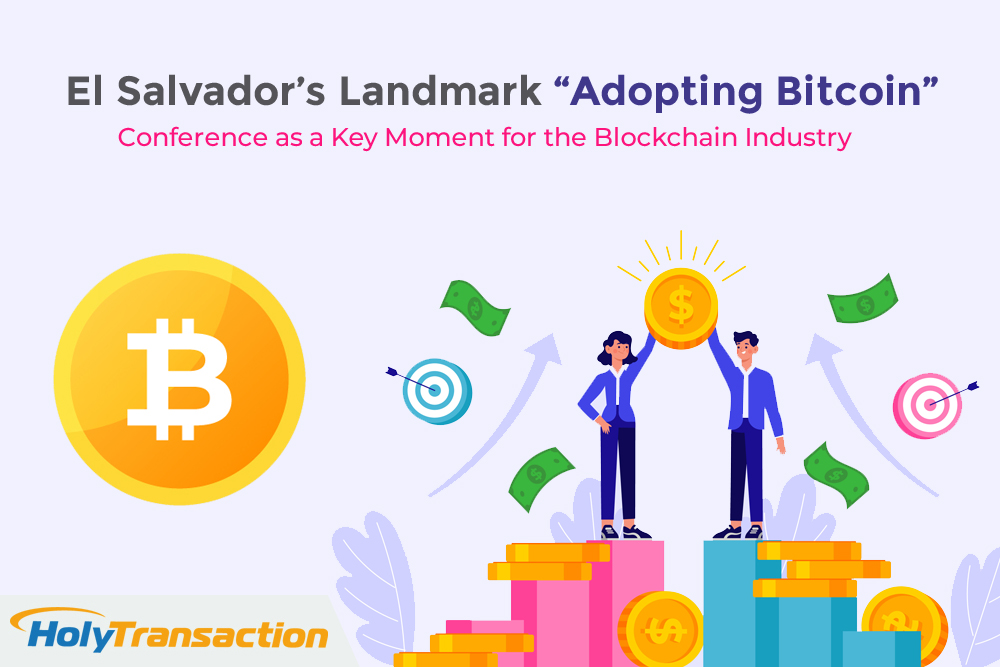
Emerging at the forefront of Bitcoin innovation, El Salvador is working toward achieving a level of financial independence and openness independent from a centralised banking system. El Salvador has paved the way for other nations to follow in its footsteps by becoming the first nation in the world to recognise Bitcoin as a legitimate currency.
To encourage worldwide collaboration and proliferate networking avenues for Bitcoin enthusiasts, El Salvador hosted the “Adopting Bitcoin” Conference over 3 days, between November 15 and 17. The event took place in San Salvador and at Bitcoin Beach and brought together members of the Bitcoin ecosystem from a multitude of states.
More than 110 speakers from over 30 countries discussed the most recent breakthroughs throughout the whole range of Bitcoin-related disciplines, including those pertaining to technology as well as economics.
In this setting, the presentation of the Bitcoin core engineer Jon Atack was a significant highlight, focused on technology and development, while the presentation of Mexican senator Indira Kempis will be the most famous name in the track focused on economics. The multi-stage event will be held in English, with Spanish translations provided in real-time for the most critical phases.
Paolo Ardoino, the Chief Technical Officer of Bitfinex, is one of the attendees at the crypto conference in El Salvador who gained the greatest notoriety. Arduino said in his statement that his company “would redouble its efforts to establish a free, unstoppable, robust, and open Bitcoin and technological infrastructure for El Salvador.”
Overall, Bitfinex has committed to working closely with the government of El Salvador, which is currently mired in debt and is governed by President Nayib Bukele, to devise an appropriate regulatory framework for the cryptocurrency market and other digital assets in the nation. Ifinex, the parent company of Bitfinex, has agreed with the government of El Salvador to work together on developing a regulatory framework for digital assets and securities.
While adverse market dynamics hindered the optimism around the event, there is a suite of conclusions that indicate the ongoing commitment of Bitcoin leaders and pioneering nations like El Salvador to still pursue the broader adoption of Bitcoin as a payment medium.
As the blockchain industry, as well as all the other financial sectors, witnessed in 2022, the price of Bitcoin and other cryptocurrencies declined primarily due to the Federal Reserve’s strategy of dramatically raising interest rates to curb rising inflation in the United States, which caused the cost of money to increase. Subsequently, the remainder of the decline was caused by a succession of events, including the bankruptcy of organisations involved in cryptocurrency trading and the collapse of currencies such as Terra USD. Large investors sold out these high-risk assets, precipitating a precipitous value decline.
El Salvador’s President, Nayib Bukele, announced that the nation would begin buying one Bitcoin each day starting with November 17, 2022. The use of dollar-cost-averaging (DCA) in Bitcoin transactions is widespread among the community, yet it is unprecedented for a nation-state. When Bukele’s proclamation was made, the nation possessed a Bitcoin treasury that included 2,381 BTC and had a worth of more than $39 million.
So far, Bukele has made it a pattern in the past to acquire a significant quantity of Bitcoin during periods of market instability and to “buy the dip.” This action would signal the end of a nearly five-month pause amid severe bear market circumstances and the collapse of Sam Bankman-massive Fried’s $32 billion FTX enterprise.
According to NayibTracker, Bukele made his most recent purchase of Bitcoin on June 30, 2022. At that time, he paid $1.52 million for 80 Bitcoins (worth around $1.33 million), which works out to an average price of $19,000 per coin.
Overall, El Salvador’s “Adopting Bitcoin” conference serves as a reminder of the ongoing commitment of crypto pioneers and their belief in the long-term potential of this cutting-edge technological revolution.
Open your free digital wallet here to store your cryptocurrencies in a safe place.
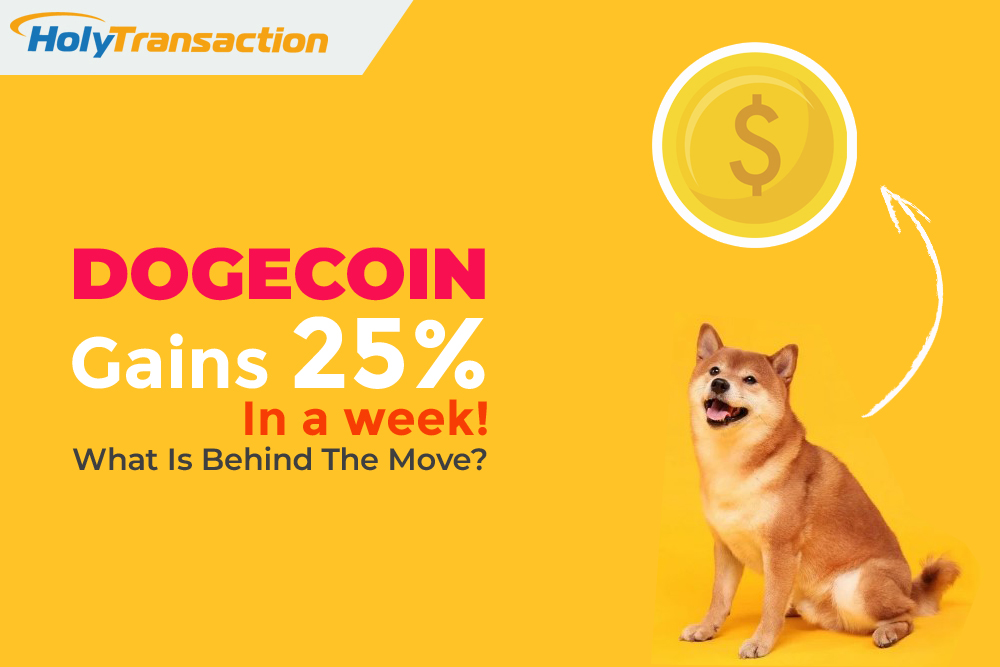
Popular cryptocurrency meme token Dogecoin ($DOGE) recorded record 25% gains in the last week as Twitter CEO continued to update his followers on what the future might have in store for the popular social media platform.
As well as the distinct possibility of Dogecoin being used for micropayments on the site, Musk was quick to remind his followers that all being well, lunar satellite DOGE-1 will be going in to orbit in the first part of the new year.
Alongside other lunar payload IM-1/NOVA-C, DOGE-1 is to catch a ride with the SpaceX Falcon 9 which is set to take off from the Kennedy Space Centre, Florida on January 14th 2023.
The Doge moon mission was first announced by Elon Musk in May 2021 but delays related to the IM-1 lunar lander have mean that the project has been pushed back. The renewed interest seems to be behind last week’s surge in the price of Dogecoin.
The price of Dogecoin currently stands at $0.094 which with a market cap of $12.5 billion makes the coin the 8th most popular cryptocurrency in the world today. Despite a recent drop of 4.5% over the last 24 hours the price action for Dogecoin over the last 7 days makes the coin one of the top movers in the past week.
Elon Musk’s relationship with Dogecoin is well documented with previous tweets by the newly installed Twitter boss having a profound and immediate impact on the token price. As recently as 25th November Dogecoin rose over 8% in as little as 24 hours after popular cryptocurrency podcast host David Gokhshtein told his 700,000 followers that he believed that Ethereum co-founder Vitalik Buterin would soon be working alongside Elon Musk to improve the efficiency of Dogecoin.
Interestingly, Mr Buterin commented that Dogecoin developers ought to think of transforming to a Proof of Stake based blockchain in September 2021 stating that the current Ethereum code can be easily used for such a transition.
How the future pans out is anyone’s guess but given recent events it may be safe to say that the future looks bright for DOGE. If the launch of the Doge-1 lunar satellite goes according to plan together with the much discussed possibility of DOGE being accepted as a micropayment option on Twitter then we may begin to see Dogecoin exceeding its record highs of $0.68 which were recorded in May 2021.
Of course, any price rise must take into account macro economic factors and the rising rates of global inflation but safe to say, Dogecoin is one of the most funny projects in cryptocurrency right now.
Open your free digital wallet here to store your cryptocurrencies in a safe place.